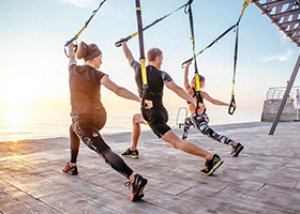
All iLive content is medically reviewed or fact checked to ensure as much factual accuracy as possible.
We have strict sourcing guidelines and only link to reputable media sites, academic research institutions and, whenever possible, medically peer reviewed studies. Note that the numbers in parentheses ([1], [2], etc.) are clickable links to these studies.
If you feel that any of our content is inaccurate, out-of-date, or otherwise questionable, please select it and press Ctrl + Enter.
Sports may counteract the development of glaucoma
Medical expert of the article
Last reviewed: 02.07.2025
 ">
">According to the results of a new study, physical activity - especially high-intensity - can reduce the risk of developing glaucoma. And, as we know, glaucoma is the most common cause of complete vision loss.
To prevent glaucoma, experts recommend regular exercise – at least simple activities such as walking or morning jogging.
Researchers from the University of California, Los Angeles, summed up the results of their work based on an assessment of statistical data. National indicators in the United States indicate that physically active people suffer from glaucoma more than 70 times less often than those who neglect physical exercise.
Glaucoma is a rather pressing issue, as it is the main cause of complete loss of vision in people. If you look at Russian statistics, you will find that more than 1 million people in the country suffer from glaucoma, a disease that is practically untreatable.
The World Health Organization notes that four years ago, almost 65 million patients with glaucoma were registered in the world, aged 40 to 80. According to disappointing forecasts, this figure could increase to 110 million in 20 years.
According to Professor Victoria Tseng, physical exercise stabilizes intraocular blood flow and normalizes intraocular pressure. The researchers decided to study this mechanism in detail, based on information obtained during the National Health and Nutrition Examination Survey.
The project lasted for almost five decades, starting in 1960. It involved assessing the relationship between human illness and external factors. For example, scientists analyzed the relationship between walking and the risk of developing glaucoma among volunteers aged 40 and above.
The standard values are as follows: seven thousand steps every day is equivalent to half an hour of moderate physical activity at least five days a week (this value is the recommended norm for Americans).
The study found that increasing walking speed by 10% reduced the risk of developing glaucoma by 6%. Increasing weekly physical activity by 10 minutes reduced the risk of glaucoma by 25%.
"During the study, we made certain conclusions. For example, to prevent glaucoma, it is not enough to just do physical exercise - it is desirable that the loads be as intense as possible. Daily jogging, Nordic walking, as we believe, improve the circulation of intraocular fluid and stabilize the course of trophic processes inside the eye. Sports are an accessible method of prevention for everyone," concludes Professor Tseng.
Even though clinical trials have not yet been conducted, it is safe to say that exercise can indeed be beneficial for many of us.
The scientists presented the results of the study at the annual congress of the American Academy of Ophthalmology in New Orleans. This information is also displayed on the congress website.


 [
[